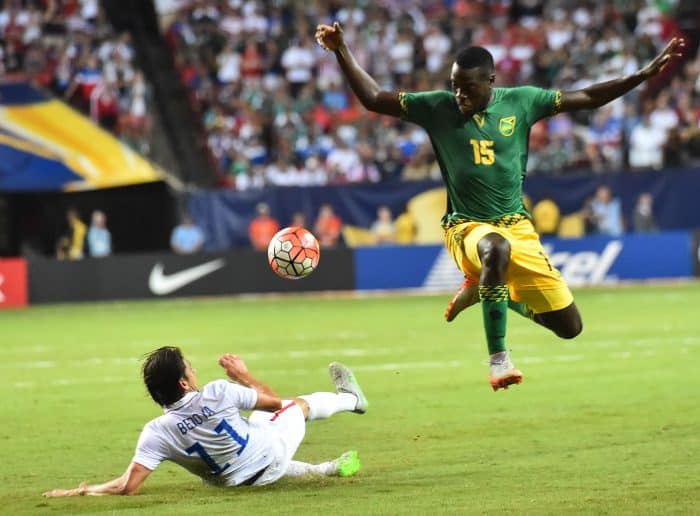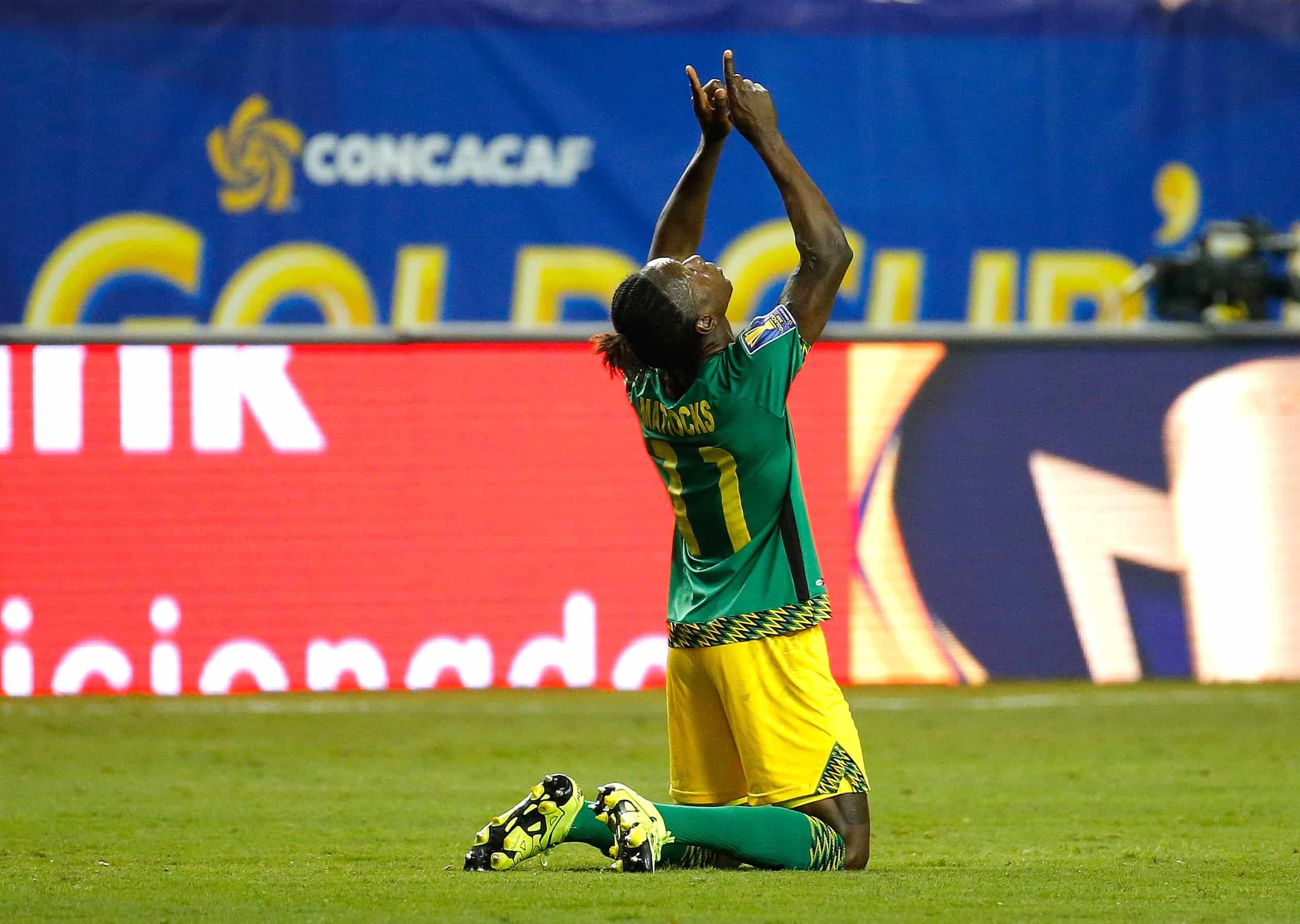ATLANTA — For almost 25 years, the U.S. men’s national soccer team has enjoyed a wealth of success at the CONCACAF Gold Cup. The U.S. have not always won the biennial regional championship, but until Wednesday, they had never been shown the door by a lesser program.
In five messy minutes of the first half, Team USA’s good fortunes took a terrible turn in front of 70,511 at the sold-out Georgia Dome. And when a second-half uprising fizzled without an equalizer, Jurgen Klinsmann’s squad had been eliminated in the semifinals by Jamaica, 2-1.
This was no fluke: The Reggae Boyz were the superior side in building a 2-0 halftime lead on goals by MLS-based forwards Darren Mattocks and Giles Barnes. Michael Bradley answered three minutes into the second half, but the U.S. failed to capitalize on an abundance of opportunities to draw even.
And so instead of a mega-showdown between the region’s longtime bullies, the United States and Mexico, Jamaica will go to Philadelphia on Sunday to play the Mexicans, who defeated Panama, 2-1, in a chaotic semifinal that stretched into extra time.
“It’s very disappointing, very frustrating,” Bradley said. “You have no divine right to be in the final. We certainly didn’t think that. We knew from the get-go this was going to be an extremely difficult tournament. It was.”
Nonetheless, the result reached historic proportions. Jamaica defeated the United States for the second time in 23 attempts and became the first Caribbean team to advance to the tournament final.
The last time the U.S. lost on home soil to a Caribbean opponent was 1969 (Haiti).
The defeat also ended the U.S. streak of consecutive appearances in the final at five.
No CONCACAF team had ever eliminated the U.S. before the final; only formidable tournament guests, Colombia and Brazil (twice), accomplished that.

By winning the title this year, the reigning champions would have clinched a berth in the 2017 FIFA Confederations Cup in Russia, a dress rehearsal for the World Cup a year later. Now they will face Sunday’s winner in a one-game playoff this fall at a U.S. venue.
“This one game doesn’t make us a bad team; it doesn’t set us 20 steps backwards,” goalkeeper Brad Guzan said. “You learn from it. You move on.”
The manner in which it happened, however, was unsettling.
Both Jamaican goals came off set pieces: a throw-in and a free kick.
On the first, Mattocks (Vancouver Whitecaps) beat John Brooks to Kemar Lawrence’s long toss on a narrow field. Mattocks’s header floated toward the back post. Guzan couldn’t reach it. The ball struck the upright, skipped across the goal line and kissed the left post before spinning into the net.
Five minutes later, Guzan was throwing the ball upfield when his hand crossed the top of the penalty area. It’s a rarely enforced violation, but in this case, the linesman raised his flag.
“I don’t think I’ve ever seen that called, especially when it’s a matter of inches,” said Guzan, a Premier League veteran. “If the linesman is three yards behind me, I think that’s an impressive call from his point of view.”
Barnes (Houston Dynamo) took advantage, smashing a 19-yarder with pace and purpose over the defensive wall. Guzan didn’t have a prayer. The ball screamed into the top right corner, touching off wild celebrations at a corner flag and in front of the Jamaican bench.
The match turned three minutes after intermission. Ryan Thompson, a backup goalie employed by the third-division Pittsburgh Riverhounds, spilled Aron Johannsson’s 20-yard bid. Clint Dempsey charged. As he, the keeper and a defender converged, the ball squirted to Bradley for a routine finish.
A torrent of chances then flooded the Jamaican end. Thompson couldn’t handle Fabian Johnson’s free kick, but Johannsson headed the rebound over the crossbar from close distance.
In the 57th minute, Bradley’s searing drive from 25 yards struck Thompson in the chest and hit the left post.
The Reggae Boyz stemmed the tide by slowing the pace and keeping possession, tactics that settled nerves and took the Americans out of their rhythm.
U.S. opportunities continued to flow but not with the same unrelenting regularity.

“We had enough chances to put three, four, five [goals] in there,” Klinsmann said of the spell early in the second half. “We kept pushing, pushing, pushing and had enough chances.”
Those chances began to evaporate, however, and the Americans ran out of time.
“What we were doing from the first minute to the last minute was over the limit,” said Winfried Schaefer, Jamaica’s German coach. “I am very happy. We are not finished. We cannot make a party now. We have one match more.”
In the second game, despite playing the last 65 minutes of regulation with 10 men, Panama carried a 1-0 lead into the waning moments. U.S. referee Mark Geiger then awarded Mexico a penalty kick when Roman Torres, the Panamanian goal scorer in the 57th minute, fell on the ball while jostling with an opponent in the six-yard box. The ball appeared to graze his arm but mostly ran up against his side.
Fans pelted the field with garbage, prompting players and staff on both teams to beg for calm. As players gathered near the benches, however, several incidents broke out.
When order was restored, Andrés Guardado converted the penalty. On Sunday, a controversial call in the 120th minute had allowed Guardado to score the winning penalty against Costa Rica.
Geiger whistled another penalty against Panama 14 minutes into extra time, but this one was a clear foul. Guardado converted again. All of the Panamanians on the field and sideline mocked Geiger by applauding.
When the game ended, the Panamanians raced toward Geiger. Security officials escorted him off the field.
© 2015, The Washington Post






